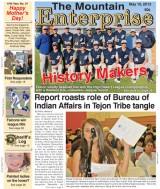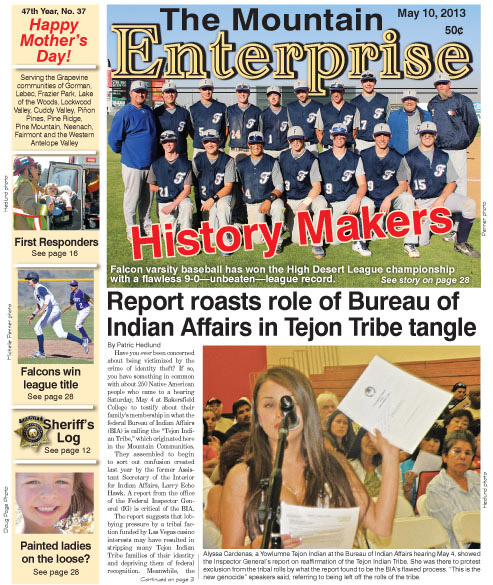![Alyssa Cardenas, a Yowlumne Tejon Indian at the Bureau of Indian Affairs hearing May 4, showed the Inspector General’s report on reaffirmation of the Tejon Indian Tribe. She was there to protest exclusion from the tribal rolls by what the report found to be the BIA’s flawed process. “This is the new genocide” speakers said, referring to being left off the rolls of the tribe. [Hedlund photo]](https://mountainenterprise.com/wp-content/uploads/E-01-TejonIndians1-375x275.jpg)
Image 1 of 4
Alyssa Cardenas, a Yowlumne Tejon Indian at the Bureau of Indian Affairs hearing May 4, showed the Inspector General’s report on reaffirmation of the Tejon Indian Tribe. She was there to protest exclusion from the tribal rolls by what the report found to be the BIA’s flawed process. “This is the new genocide” speakers said, referring to being left off the rolls of the tribe. [Hedlund photo]![Kathryn ‘Kathy’ Morgan [Hedlund photo]](https://mountainenterprise.com/wp-content/uploads/E-03-TejonIndians-2-271x300.jpg)
Image 2 of 4
Kathryn ‘Kathy’ Morgan [Hedlund photo]![One of the speakers at the May 4 BIA hearing in Bakersfield wore a Tejon Ranch cap. He thanked the BIA for holding the hearing. [Hedlund photo]](https://mountainenterprise.com/wp-content/uploads/E-22-TejonRanchCap-375x281.jpg)
Image 3 of 4
One of the speakers at the May 4 BIA hearing in Bakersfield wore a Tejon Ranch cap. He thanked the BIA for holding the hearing. [Hedlund photo]![Delia ‘Dee’ Dominguez [Hedlund photo]](https://mountainenterprise.com/wp-content/uploads/E-03-TejonIndians-3-277x300.jpg)
Image 4 of 4
Delia ‘Dee’ Dominguez [Hedlund photo]
By Patric Hedlund
Have you ever been concerned about being victimized by the crime of identity theft? If so, you have something in common with about 250 Native American people who came to a hearing Saturday, May 4 at Bakersfield College to testify about their family’s membership in what the federal Bureau of Indian Affairs (BIA) is calling the “Tejon Indian Tribe,” which originated here in the Mountain Communities.
They assembled to begin to sort out confusion created last year by the former Assistant Secretary of the Interior for Indian Affairs, Larry Echo Hawk. A report from the office of the Federal Inspector General (IG) is critical of the BIA.
The report suggests that lobbying pressure by a tribal faction funded by Las Vegas casino interests may have resulted in stripping many Tejon Indian Tribe families of their identity and depriving them of federal recognition. Meanwhile, the group allied with gambling factions has been left in charge of deciding who is, and who isn’t, allowed to claim membership in the Tejon Indian Tribe.
Some members of the families which have the oldest documented occupancy of lands now known as Tejon Ranch have stated that they are opposed to the tribe becoming partners with gambling speculators. These families, including those led by tribal Chairwoman Delia ‘Dee’ Dominguez (of the Kitanemuk and Yowlumne Tejon Indians) have allegedly been removed from the Tejon Indian Tribe membership rolls by limiting the test for qualifying members to the 1915 ‘Terrell census’ after many “had been driven off [of what had then become Tejon Ranch] or killed.”
Several speakers at the hearing on May 4 mentioned other means for assessing tribal membership more accurately. Those included a census from the 1890s and an 1851 treaty negotiated between the 11 Tejon Indian bands of this area and the U.S. Indian Agent. The treaty was signed by 29 tribal leaders, including several related to Dominguez and her clan.
A faction led by Tribal Chair Kathryn Morgan, who the Inspector General’s report indicates had the partnership with the Las Vegas casino developers, obtained funds to engage a Washington, D.C. law firm to maintain lobbying pressure on the BIA that led to “reaffirmation” by Echo Hawk. The IG report documents his decision to skirt normal procedures to make the reaffirmation.
The Federal Inspector General’s job is “to detect and prevent fraud, waste, abuse and violations of law…in the operations of the federal government.”
The investigation began just a few weeks after Echo Hawk issued the January 2012 memo in which he said that a federal government administrative mistake had caused the Tejon Tribe to be dropped from federal rolls of recognized tribes, and so going through usual procedure should not be necessary.
It is Kathryn Morgan who the BIA now refers to as the Tribal Chair of the Tejon Indian Tribe in an autonomous government-to-government relationship with the U.S. That gave her faction funding from the California tribal gaming commission to hire a tribal administrator and offer a variety of social services to her affiliates.
Tejon-area native people who object to the Morgan group’s actions have asked for an injunction to stop such payments until the issue of how to test “delineation” for the tribe’s membership has been settled.
They also are calling for the development of a constitution under the fair auspices of the BIA, and tribal elections of officers. Morgan’s group is now creating their own constitution and amendments, and holding elections without input from other potential members of the Tejon Tribe.
Members of the Jacobo family were well-represented at the May 4 hearing, with over 125 relatives attending. Armando Salazar, for instance, and representatives from several other family groups, such as Loretta Sandoval, said that Tribal Chair Kathryn Morgan had “closed the door to us” or threatened to have them removed “from the BIA” or not recognized. They said they wish to give their declaration of lineage directly to the BIA.
Morgan said in a brief interview after a huddle with her attorneys following the hearing that she had laughed about being said to have “shown so many people the door.”
Morgan’s attorney refused to give his name or contact information for follow-up fact-checking for this report. The Mountain Enterprise was the only media reporter at the event, and we provided 20 business cards to those who requested contact information.
“We know how to contact you,” the attorney said, refusing three polite requests for his name and the name of his firm as representatives of the tribe.
According to members of the Jacobo family, the Morgan group held a meeting at the Fox Theater in Bakersfield on April 20, 2013 to which some (but not all) potential members of the Tejon Indian Tribe were invited by certified letter.
But, they said, when they got to the meeting and asked for a copy of the Tejon Indian Tribal constitution, they were told that none were available.
“We don’t know if we are to be considered full voting members, or some other class of member,” they said.
Kathryn Morgan and her tribal administrator said they had voted to expand their rolls, including family members such as grandchildren with less than 3/16 Tejon Indian Tribe blood (lineage).
When we asked the tribal administrator if that could be considered an attempt to expand their representation without including members of other clans that have claims to be included in the Tejon Indian Tribe, he did not answer.
Asst. Secretary Echo Hawk said in an April 2012 memo, just before he left the position, that he was “not really sure who the Tejon Indian Tribe was” when he signed the reaffirmation, and he is “not really sure now” (four months later as he wrote the memo calling for clarification about delineation), Dominguez said.
The expressed goal for the BIA hearing last week, said Robert ‘RJ’ Eben, superintendent of the Southern California Agency of the BIA, was to begin the process of defining the delineation of tribal membership.
There has been speculation about Tejon Ranch Company involvement in long term plans for a gambling casino in this area. At the Kern County Board of Supervisors’ hearing at which the board voted to provide a green light for the building of Tejon Mountain Village, several speakers stood to comment about Tejon Ranch’s relationship with Native American groups and their alleged interest in developing a casino.
When Tejon Ranch began to develop an outlet mall in 2012 on a spur of road that heads east from the northern base of the Grapevine last year, that speculation resumed. Outlet malls and Indian casinos are often located together. With 77,000 vehicles a day passing on Interstate-5, a gaming casino has been viewed as a tempting draw to bring people up that road. Such a business plan lends logic to the notion that Tejon Ranch Co. may have had a behind-the-scenes role in assisting the Morgan group’s “reaffirmation” efforts. The IG’s report expresses concern at the way in which the reaffirmation occurred. Tejon Ranch Corp. has denied any interest in a casino.
This is part of the May 10, 2013 online edition of The Mountain Enterprise.
Have an opinion on this matter? We'd like to hear from you.


